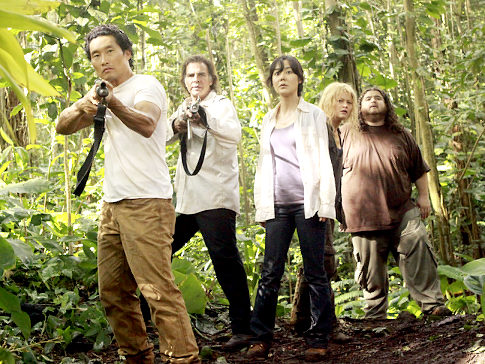On Sunday night, Lost concluded its six-year run with a nausea-inducing smorgasbord of meet-cutes and hackneyed dialogue, securing its place on the mantle occupied by The Sopranos and the Battlestar Galactica remake. Here was a once great program — a formerly fine creative offering that had once juggled philosophy, intricate human relationships, and quantum theory — reducing itself to poorly contrived romance. You almost expected a dying Barbara Hershey to show up, with Bette Midler singing to a packed Hollywood Bowl crowd. But the bar was perched much lower with Drive Shaft playing the Widmore concert. In one of many preposterous lines delivered over the course of the night, a man told a woman giving birth, “I’m with the band.” Which surely counts as one of the most preposterous explanations related to pregnancy in television history.
Granted, the sixth season’s sideways universe, reliant as it was upon improbable coincidences and even less convincing human behavior, represented a vile wish fulfillment. But wouldn’t it have been more interesting to be conned more respectfully? It was difficult for any reasonable person to believe that Hugo would conveniently show up after Locke had been fired and offered a job. We saw last week that Desmond, Kate, and Sayid were criminals on the lam, but, this week, they magically eluded any and all APBs. And in an even worse surrender, the knowledge of their lives on the island was translated by touch. The finale’s closing moment, more interminable than a soporific Oscars ceremony and containing the discomfiting whiff of some Fred Phelps-like figure steering the story, suggested less gracefully than Ambrose Bierce (or even Jacob’s Ladder writer Bruce Joel Rubin) that the last six years had more or less been inside Jack’s Judeo-Christian head. (No accident that dear papa was named Christian.) And we were blessed with the producers insulting the audience’s intelligence with that dreadful church congregation. With its sixth season, Lost had capitulated its artistic credibility for the doldrums of dumbed down entertainment. What if the program had ended with the nuclear bomb and the sacrifices at the end of the fifth season? Would this not have created more enigmas for the febrile Losties to argue about at conventions over the next few decades? Would this not have been greater art? The mysteries resolved in the last year were done so with such distressing literalism that one sensed the telltale smell of otiose ABC executives pressuring writers into a more pedestrian direction.
But beyond any speculations (and there will no doubt be many), it was clear this year that the writers didn’t have a plan and they didn’t know when to quit. They concluded the show with a half-hearted amalgam of Stephen King’s The Dark Tower and Charles Beaumont’s short story, “The Howling Man.” The characters had moved on. Evil had to be stopped from leaving the island. The Man in Black fled across the isle, and the surgeon followed.
The two people to blame for Sunday’s catastrophe are writers Damon Lindelof and Carlton Cuse, who were also responsible for the gratuitous spoon-feeder “Across the Sea” from two weeks earlier. Indeed, you can trace the abysmal dip in Lost‘s writing quality to Brian K. Vaughan’s exit just before the final season. He was hired as an executive story editor during the third season hiatus, when the series was in tremendous trouble with too many forced imprisonments and not enough momentum. And a program that looked as if it was a lost cause suddenly became interesting again. Then Vaughan left. We may never know the real reasons why. But PR spin will shine its rosy light in the years to come.
As a result, Lost, which had become so wonderfully convoluted during the fifth season with two head-spinning and steadily shifting timelines, became a viewing experience in which you could fold laundry and still follow the plot. It took a great celestial concept and turned it into The Celestine Prophecy. It rejected the built-in audience that had theorized so fervently over the years and pissed into its face. And that’s too bad. Because for a long time, Lost was above such debasement.
